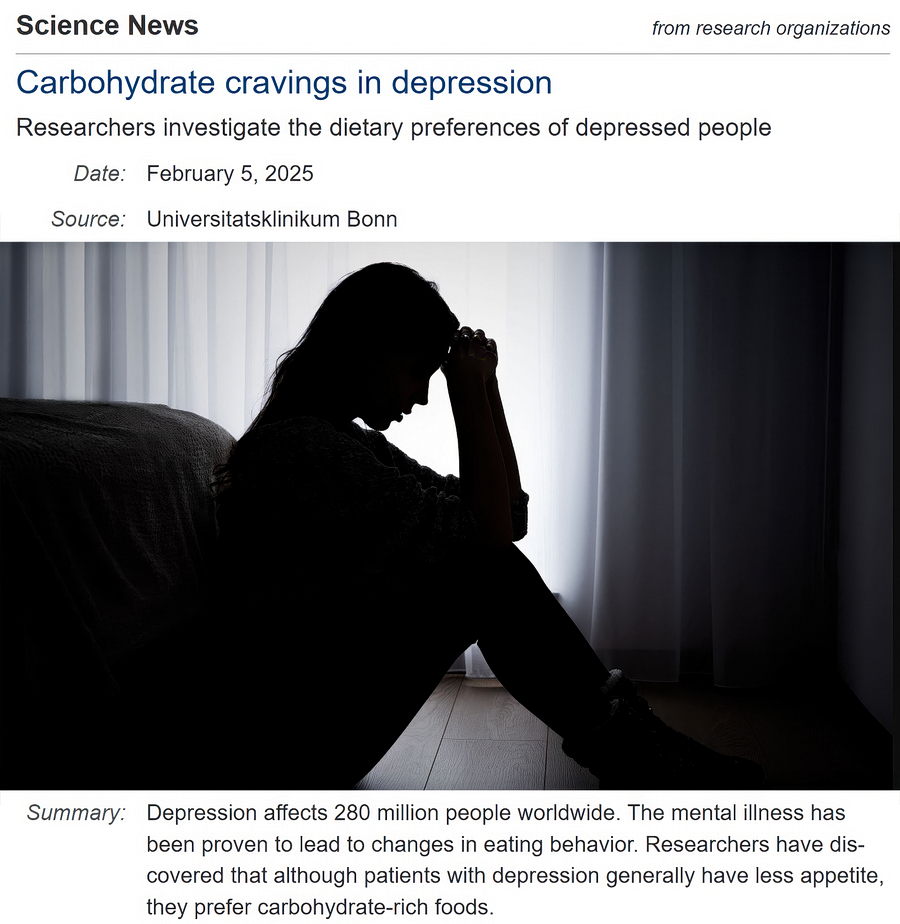Today we’ll visit Science Daily, as in “Pseudoscience Daily,” a government ass-kissing website that summarizes the latest stupidity in the field of medical- and nutritional backwards research. This time they reviewed a study on depressed people and their cravings for toxic and unnatural carbohydrates. It should be a no-brainer, but alas, the stupidity of this world we find ourselves in is unbound and unlimited. Let’s see what they put together.
“Every depression is different. These differences are also evident in appetites. Patients, especially those with severe depression, often report changes in their appetite. Many people with depression suffer from a general loss of appetite. Others have more appetite during a depressive episode and even develop food cravings — especially for sweets.”
Well, the most accepted causes of depression can involve one or several factors, such as neurotransmitter imbalance of serotonin, dopamine, GABA, and glutamate, all fixable by adopting our natural human diet and especially focusing on vitamins and animal fats, especially the “B vitamins” that are only found in animal foods and does not exist in plants. Another factor is disruptions in the sleep-wake cycle and circadian rhythm, which is usually due to bad sleeping habits, too much screen time, snacking and eating late, and the abysmal composition of your diet — also quite easily fixed. Another is changes in brain structure and function, such as reduced neurogenesis, and this is usually from toxicity and/or nutritional factors such as lacking cholesterol and/or saturated fats in the diet. Again, also quite easily fixable. And then we have stress and trauma, while stress is manageable and can be controlled, especially with a good diet high in animal fats, trauma might need some work — however, that is also a lot easier if properly fed on animal-based foods, especially cholesterol and omega-3, and your brain starts working as intended.


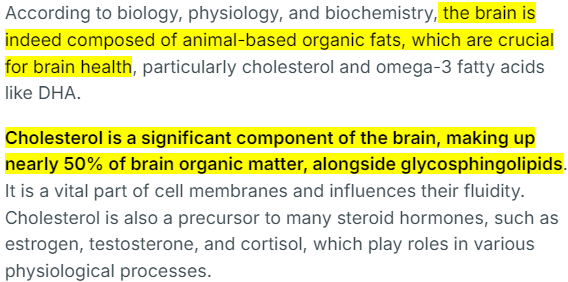


It’s obvious that nutrition plays a big part in most of the causes behind depression, and so does toxicity, which also mostly comes from the diet, as in your nutrition.
“Despite these reports, little is known about the eating preferences of patients with depression, even though this information could perhaps promote new therapeutic approaches.”
Eating preferences? Is that really relevant? There is only one species-appropriate, species-specific diet for humans, only one diet that is natural and will support health and wellbeing, and that diet is a carnivorous diet as humans are obligate hyper carnivores. Anyone who shows symptoms, as in their body is trying to detoxify and heal damaged tissue, should always be advised to immediately change their diet to our appropriate natural diet. That is common sense.


In other words, it doesn’t matter what kind of stupid crap they consume, whether a depressed person prefers bread or pasta is irrelevant, as anything that is not animal-based is toxic crap and contributes to the toxic load and the damage being done to their bodies (and brain!)
Carbohydrates are craved even in combination
“The study now shows for the first time that depression is associated with specific changes in eating preferences, which can be explained by the composition of the foods shown. Crucial components for preferences are so-called macronutrients, which make up our diet: carbohydrates, proteins and fats. Carbohydrates are one of the main sources of energy for human cells.”
Wrong! The only cells in the human body that require glucose to function are red blood cells! Central Nervous System cells, including neurons, usually prefer glucose, but can utilize ketones when we run on our natural fat metabolism as we are supposed to. All other cells, especially muscle cells and the liver have the flexibility to use fatty acids, glucose, and amino acids as energy sources. Usually, glucose is used as a quick fuel when needed, and that is why we manufacture our own glucose through gluconeogenesis and always in the perfect amounts needed, because glucose is actually toxic to all our soft tissues. That is why glucose levels are always strictly controlled by the body, and every time you for some idiotic reason consume carbohydrates that turn into glucose, you upset this delicate and important balance — damaging your soft tissues, reducing your lifespan.


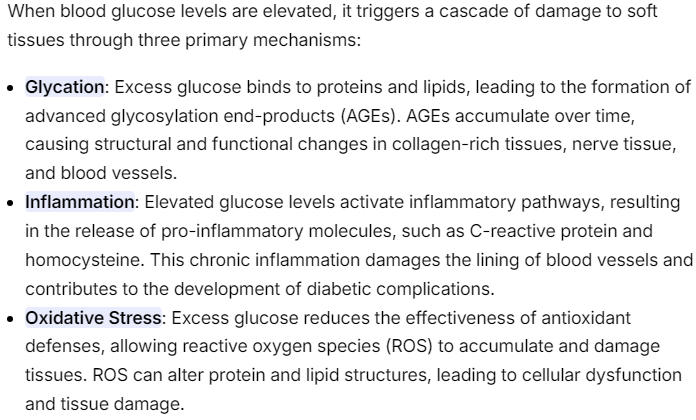
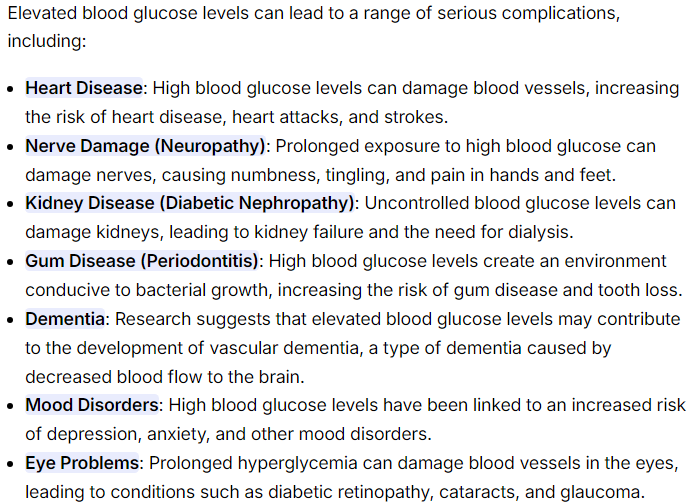
“People suffering from depression show a lower craving for foods rich in fat and protein compared to a healthy control group. In contrast, they tend to prefer carbohydrate-rich foods such as sweets.”
This is actually true for most people with a broken metabolism, as in they have suppressed their ability to manufacture their own glucose through gluconeogenesis while their cells (especially muscle cells and brain cells) have adapted to be dependent on glucose and have difficulty using fatty acids as fuel. Thus, they become dependent on a steady supply of exogenous carbohydrates to sustain their need of glucose, or they will become very tired, fatigued, and lethargic as they can not mobilize enough energy to function.

So, in depressed people, who are much more aware of how they feel, especially when it comes to mental energy, focus, and drive, they become even more sensitive to this and will reach for a quick fix, as in carbohydrates, especially “fast-acting” sugars as in sweets, as soon as they feel a “dip” in their energy levels. Simple, and common sense.

“In the study, a higher proportion of carbohydrates also led to an increased liking of fat- and protein-rich foods for people with depression. In other words, patients with depression also had an increased craving for foods combining fat and carbohydrates such as milk chocolate. Such energy-dense foods also tend to characterize an unhealthy diet.”
Yes, the toxicity and damage from high blood glucose levels and the foods that deliver that glucose will encourage the body to seek out more nutrients. While the body wants animal-based foods, as in fatty meats, to be able to detoxify and heal damaged tissues, people with disrupted metabolisms will interpret these cravings by reaching for anything fatty and anything that is convenient and easy to access, which often is processed garbage, rich in both carbohydrates and extremely toxic seed/vegetable oils. They have no clue about what the body actually wants, what the body actually needs, and will instead go for anything edible, similar, and convenient that temporarily satisfies that urge, that craving. Of course, as these foods have zero nutrition, the cravings will come back as soon as that crap has been digested, as the body is still missing nutrients. Again, common sense.



“Until now, it was assumed that the craving for carbohydrate-rich foods was linked to a greater appetite. We were now able to show that this is not the case. In fact, carbohydrate cravings are more related to the overall severity of depression, especially anxiety symptoms, explains first author Lilly Thurn.”
Appetite and cravings are two totally different things. And no, cravings are not really related to the “severity” of depression and/or anxiety. While eating can be a distraction if you feel really bad, you usually feel “really bad” because of your broken metabolism and extremely bad diet and lifestyle. Cravings occur when your body needs or is lacking something, as in nutrient deficiencies or when running low on energy, which can be quite often if you’re dependent on glucose and can’t really manufacture your own glucose as healthy people do. And again, if you’re suffering from “depression” you will notice this much more often as you will be more sensitive to fluctuations in energy levels, especially your brain.


Keep in mind that while your brain needs glucose, it runs best on a combination of glucose and ketones. And the production of ketones only increases when you are in ketosis, as in running on your fat metabolism (not consuming any carbohydrates at all,) which is also when your body manufactures its own glucose in perfect quantities. Again, foolproof evidence that we are meant to always run on a fat metabolism and never on “carbohydrates” as in “glucose.”

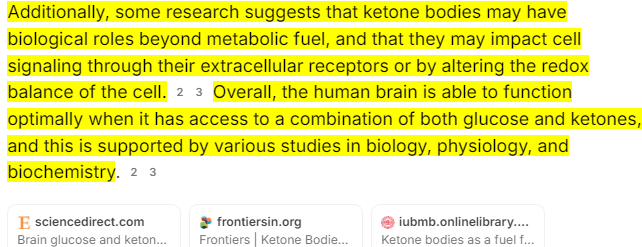

Keeping a closer eye on nutrition in the future
“The results of the study now raise further questions for future research and treatment. Since carbohydrate-containing foods control the reward response in the brain via different signaling pathways than fat- and protein-rich foods, it may be possible to derive better treatment approaches from this, explains Prof. Nils Kroemer.”
While this is true, it’s still totally irrelevant. Focus on fixing the real problems instead, and that always starts with proper natural human nutrition. You can not heal, nor function properly without a lot of animal-based foods. This is always where you should start, and also, this is always where you will see immediate positive results. After fixing the diet, you might need to pin-point different things, depending on the damage done and the symptoms from recovering and healing. But that’s way beyond this article.

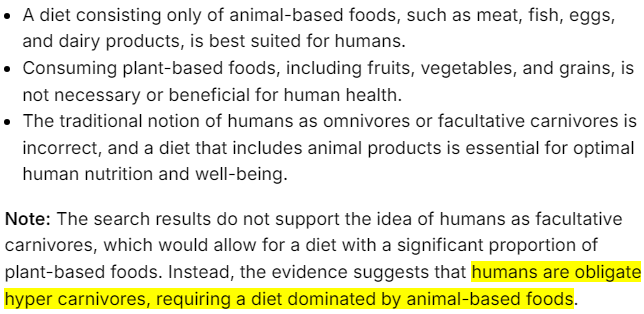
“In the future, an accompanying dietary therapy could therefore be put to the test if a change in preference for certain foods occurs during depression. It could also be investigated whether a lasting improvement in depression is possible by optimizing the patient’s diet.”
Yes, exactly, but that is only possible with our species-specific, species-appropriate diet, as in going fully carnivore, and that is usually something quacks and Big Pharma shills like these do not prescribe, as they are brainwashed useful idiots trained by the medical establishment to keep people weak, docile, and dependent on their inverted treatments — and that is also why they discuss irrelevant things like ratios between protein, fats and toxic carbohydrates.
So, to conclude, the only way to help the body detoxify and heal damaged tissue, including “depression,” is by removing the toxic offenders and nourishing the body with bioavailable animal-based foods. From there, you might need to work on your psyche, but that will be a lot easier with a healthy body and a functioning clear mind.
With that said, it will take 6 to 8 weeks of a fat dominant, as in a “ketogenic” diet, to get a body with a damaged metabolism to produce its own glucose again, and another 6 weeks or more to become somewhat fat-adapted, as in utilizing fatty acids effectively as fuel. In other words, most people who have become glucose dependent will feel like crap for at least 12 weeks before starting to feel better, so unfortunately, it will most likely be crucial to stick with drugs and medicines until then, and once you have more energy and start to feel better, you can phase out that toxic crap and really start to heal.
If you need help with any kind of health problems or transitioning from your current way of eating to our natural species-appropriate, species-specific way of eating, I’m available for both coaching and consultation.
Coaching and Consultation
And if you found the article and my insights helpful and enjoy my daily free information, please consider donating to help pay the webhosting bills and keep the site running. And if you’re interested in discussing and sharing information with likeminded people, consider joining our uncensored community at Ungovernable.se. Thank you!

